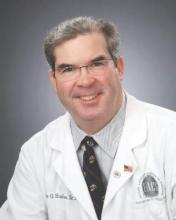I heard the expression, “This is the age of specialization” the other day and I winced. As a general surgeon, I understood the implicit corollary that I was not a specialist. I disagree, by the way. As a person interested in the public good, I winced because subspecialization is an oft-repeated mantra as a solution to all the surgical world’s problems. That just isn’t so, any more than that generalism is the solution. As my father used to say, “All generalizations are false – including this one.”
We have more than one issue in surgery today. Simply creating more and more subspecialists who do less and less of an area of surgery on the premise that high-volume repetitive practice creates the best public good is too narrow a view, because there is more to success in surgery than the simple performance of the procedure itself. Further, the definition of an outcome is becoming far too quantitative at the expense of an overall qualitative reality from the patient’s point of view.
The Lancet Global Surgery Commission reports that 1.5 billion people in the world have no access to surgical care when they need it and that 5 billion have no access to timely surgical care. As the Australians (presented at the Royal Australasian College of Surgeons) have found, the local conditions that result in delay in diagnosis (as well as treatment) play the major role in poor outcomes. We tend to think of the Lancet numbers as applying to underdeveloped countries, but even in the United States there are underserved areas. Successful solutions in developed countries may well mean templates for solutions in those less developed countries.
The point of this is to state that in our rush to improve the quantitative measurable results such as 30-day mortality, we find answers that lead us away from the qualitative results patients want and deserve. In relentlessly pursuing these results, we risk creating situations of inequality and unmet needs far greater than the risks to an individual patient vis à vis arbitrary definitions of outcome.
The specialty of general surgery can be described in this country as in decline. Over the past 50 years several core components of what a general surgeon did have been excised. Some of this has come through obvious advances, some through economics, and some through abdication of our surgical roles. In aggregate, this trend is leading to a further crisis that was no doubt unintended by those who made the individual decisions and changes.
Within very major training centers, the need for the general surgeon is eclipsed by the plethora of subspecialists available. Many of my academic friends at such institutions admit there really isn’t a job for the broad-based surgeon except for covering call (the acute care surgeon). The problem is that the model of a wonderful fully resourced major center doesn’t translate to suburbia, exurbias, and rural settings where most of the U.S. population resides.
We need a new definition and era of general surgery both for the United States and the rest of the world. Without it, I fear we will drift into a fragmented, patient-unfriendly, bankrupting system that treats late-diagnosed patients who travel at great personal pain to overloaded centers.
The new general surgeon I envision will not proudly proclaim that there is no operation he or she can’t do. That attitude is as outdated as resident work hours equal to the number of hours in the week, banning women from surgical careers, paying residents in room and board, or firing residents for getting married. The general surgery community must accept that times and science have changed for highly complex operations, but that the performance of “standard” and moderately complex operations must remain in the arsenal of the general surgeon. At the same time, subspecialists need to recognize that they must keep a “hands off” attitude toward these core general surgery cases and respect the obvious need throughout the world for the well-trained generalist.
Patients want a doctor they know who is close to home and who has surgical cognition of a wide nature with multiple skills to solve their problems. This local surgeon they know and trust needs to be part of a system that supports the local surgeon’s decision to send the patient to the “center” with neither economic penalty nor the implied message that the local surgeon isn’t quite up to the task.
To know everything about everything is as hard as knowing a lot about a relatively small body of knowledge, perhaps harder. To the patient, they want both – knowledgeable and dependable surgeons locally who can meet perhaps 80% of their surgical needs but also the subspecialist who can stop their heart for an hour, repair their liver or heart problem, and then reboot them. Ask yourself as a surgeon, isn’t that what you want as well for yourself? Would you really prefer to have your gall bladder out 70, 100, 400 miles away or 20 minutes from your home with equally good results?

